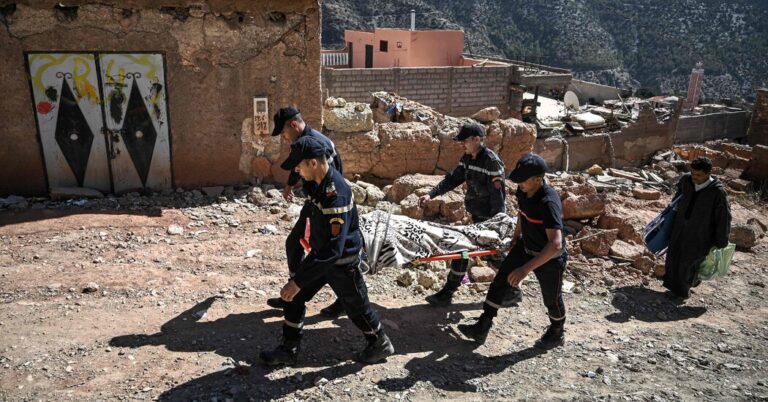As public criticism mounted over the pace and efficiency of Morocco’s earthquake response, King Mohammed VI’s government issued its first public defense of the operation on Monday, saying the authorities had promptly addressed the disaster and were dedicating their efforts to rescue operations.
The powerful quake struck the High Atlas Mountains just outside the major southern city of Marrakesh on Friday night, and killed more than 2,800 people, according to the latest government figures. King Mohammed waited hours before making his first public statement on the disaster, and has made few since.
In hard-hit villages visited by reporters from The New York Times over the weekend, there was no sign of government rescue or aid operations, though some help had begun to arrive by Monday morning.
It was a government spokesman, Mustapha Baitas, who pushed back against the criticism of the aid efforts in a video posted on social media on Sunday night, addressing it for the first time since the disaster struck.
“From the first seconds this devastating earthquake occurred, and in following the instructions of His Royal Majesty, all civil and military authorities and medical staff, military and civil, have worked on the swift and effective intervention to rescue the victims and recover the bodies of the martyrs,” he said.
Mr. Baitas’s comments appeared aimed at showing the government was in control of the response. He went on to say that hundreds of doctors and nurses, as well as ambulances and medical equipment, had been sent to hospitals in quake-affected areas, adding that the government had approved the creation of a fund to receive aid donations.
Since the earthquake, the Moroccan government has been generally tight-lipped, offering little information about rescue efforts and providing infrequent updates on casualties.
In Morocco, power is concentrated in the king’s hands and when it comes to all important matters of state, such as the current crisis, it is the royal palace that calls the shots. This leaves other government institutions paralyzed, waiting for the king to take the lead on the big questions.
“Help was extremely late,” Fouad Abdelmoumni, a Moroccan economist, said on Monday. “The overwhelming majority of victims have had nothing to eat, and some nothing to drink, for 48 hours or more, including in areas accessible by roads that are still in good condition,” he added. “Clearly, waiting for the king to give his instructions from on high” had a lot to do with it.
“The fear of overshadowing the king keeps people from taking full action until he shows up, which is expected, but you never know when that will happen,” Mr. Abdelmoumni said. “The fear also of being snubbed for any initiative has led administration officials to refrain from any action that is not expressly sponsored by the palace.”
Samira Sitail, the former head of the news division at 2M, a state-run television channel, defended the king, saying over the weekend that some leaders “run their countries over Twitter and others differently.”
The kingdom’s leadership has traditionally been cautious about communications and is wary of conveying any messages that might call its competence into question. Since the earthquake struck, state media have gone heavy on images showing show the military’s involvement in aid efforts.
One highly sensitive issue is showing the country’s poverty; some of the areas heaviest hit by the quake are impoverished. Moroccan officials prefer the world to see the country’s modern airports, high-speed trains and glittery tourist resorts. That leaning is partly a matter of national pride and partly to attract foreign tourists, who descend by the millions every year and provide a vital source of revenue.
Some Moroccans said that the lack of communication around the earthquake reminded them of the pandemic, when the authorities were similarly frugal about disseminating critical information.
On the domestic front, King Mohammed is wary of unrest at home and largely does not tolerate criticism or dissent. During the Arab Spring uprisings that swept North Africa and the Middle East more than a decade ago, the king reacted swiftly to tamp down any rumblings of discontent. He amended the Constitution, giving more power to the elected prime minister, and took other steps to pacify the population.
More recently in 2016-2017, there were ripples of unrest in the northern Rif region of Morocco. The authorities tolerated protests for a few months, then cracked down harshly.
The pandemic brought Morocco’s vital tourism industry to a standstill, but it has been bouncing back recently with hotels filling up, and foreigners returning to tour and celebrate weddings. The government may be reluctant to project any images of chaos or insecurity that could scare those tourists away again.
The country’s leaders have also appeared to be slow in accepting offers of foreign aid and rescue teams, which is consistent with Morocco’s longstanding caution about who is allowed into the country.
Mr. Abdelmoumni, the economist, criticized “the arrogance with which Morocco has disdained the offers of aid from a hundred countries,” adding that “a positive and rapid response would certainly have saved lives and avoided misery.”



